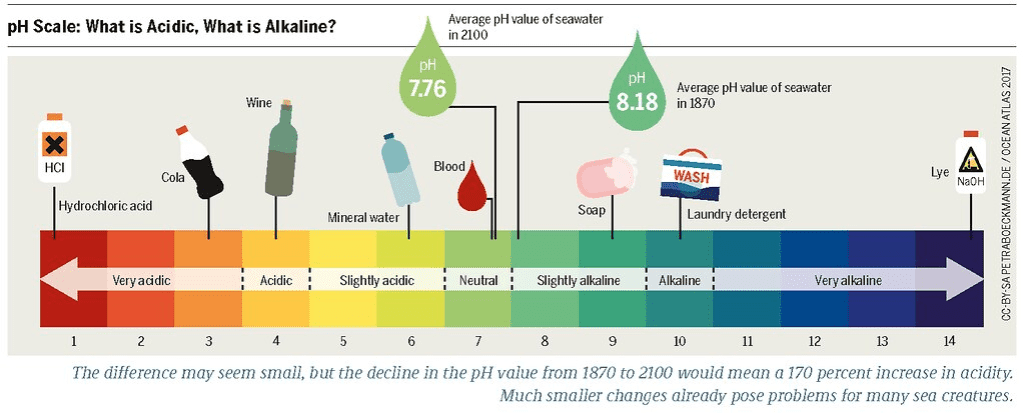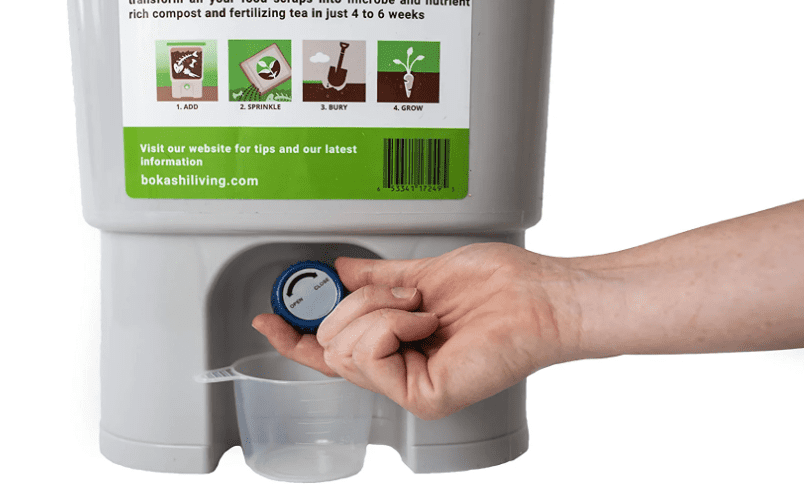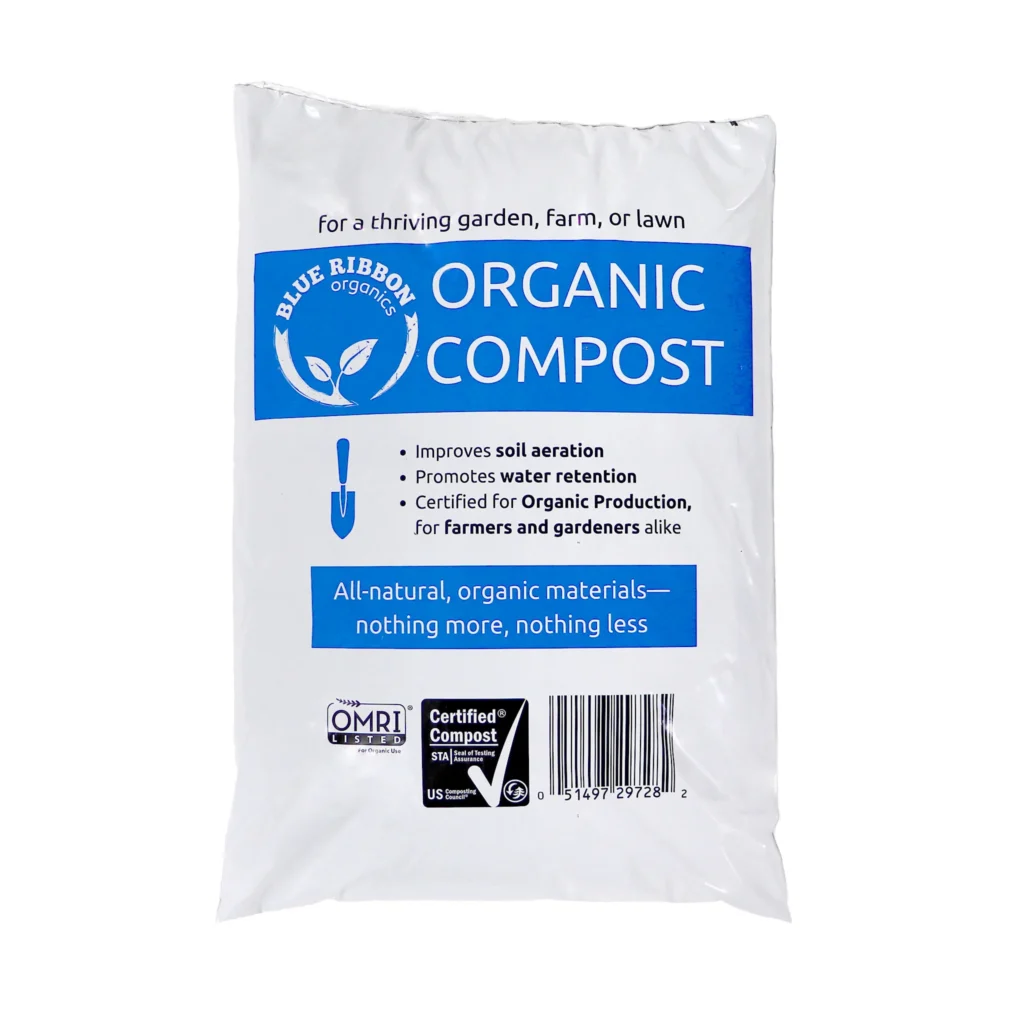Much like the pH balance in your pool, your soil has a pH level. Depending on what you’re growing, you may want soil that is more or less acidic. If you’re not sure what the pH level of your soil is, there are inexpensive testers that will tell you.
The SUNY College of Environmental Science and Forestry has a great, 3-4 minute read on soil pH. If you’d like to learn more about soil pH and get a more in-depth synopsis of it, you can read more here. You might be asking what your soil pH has to do with adding compost to your crops. Compost itself generally has a neutral pH of around 7, but this can vary based on what you put into your compost.

Additionally, when using leachate or compost tea, to further enrich your plants, it may need to be heavily diluted depending on what you’re growing.
The pH scale ranges from 0 to 14, with a neutral rating of 7. Almost all plants grow in the range of 4.5pH to 8.0pH. Generally speaking, if you aren’t too concerned with the pH balance, store-bought or homemade compost won’t hurt any of your plants. Your local nursery will likely have better compost than your big box store, otherwise, see our pick at the end of this article you can order online.
Homemade Compost
If you’ve followed the guide found here, or any of the other numerous guides online, simply spread your compost as you would any other fertilizer. The pH will probably be close to neutral. Even if it’s slightly off, it likely won’t be off enough to cause any issues or growth deficiencies in your plants.
Leachate for Soil Enrichment
Also known as ‘compost tea,’ leachate is simply the liquid runoff from your compost bucket. You can use this to add nutrients to the soil of your fruits or vegetables. The tea will need to be diluted, as it’s pretty acidic coming straight from the bucket.
For leachate coming from basic aerobic compost, use about a 1 cup of tea per gallon of water. You may need to experiment with this ratio to get the right mix since every compost makeup is different.
Measure the pH before adding the leachate, then measure again 24 hours after adding. From there, you can gauge how much it affected the soil pH. If the soil became too acidic (lower pH number), dilute the leachate. Otherwise, if it didn’t change too much from its original acidity, try adding another half cup per gallon.
Bokashi Compost Tea for Fertilizing

Bokashi leachate is a little bit different from regular compost tea. Because of the bokashi process, the leachate comes out significantly more acidic than regular compost. This can be a good thing if you’re trying to kill weeds.
On the other hand, your fruits and veggies could die because of the high acidity of the bokashi tea. Start by diluting half a cup of this tea in 3 gallons of water. Bokashi tea is usually better when covering large areas since you have to make a larger batch of it. A sprayer is typically used for this.
Best Compost for Fruits & Vegetables

Check the table at the bottom of this page for more info about what soil pH your plants will thrive in. The windows are relatively generous and allow for some variation in soil pH. Blue Ribbon Organics OMRI Certified Organic Compost is our pick as the best compost for apple trees, autoflower, bay trees, carrots, fuchsias, grapes, hibiscus, roses, sunflowers, tomatoes, and more!
There isn’t anything fancy about this compost, or its packaging. It’s merely good, old-fashioned compost that is even OMRI Certified Organic. OMRI is the Organic Materials Review Institute, a nonprofit organization. This organization determines the input products that are allowed for use in organic farming and provides certifications for products like this one.
A download link of the list below in an excel file is available here. The excel file is organized as a table so you can easily sort and filter as needed.
| Item | Min | Max | Tolerance |
| Asparagus | 6.0 | 8.0 | Moderately Alkaline |
| Leek | 6.0 | 8.0 | Moderately Alkaline |
| Marjoram | 6.0 | 8.0 | Moderately Alkaline |
| Alpine Strawberry | 5.0 | 7.5 | Moderately Alkaline |
| Peanut | 5.0 | 7.5 | Moderately Alkaline |
| Cauliflower | 5.5 | 7.5 | Moderately Alkaline |
| Corn | 5.5 | 7.5 | Moderately Alkaline |
| Garlic | 5.5 | 7.5 | Moderately Alkaline |
| Parsnip | 5.5 | 7.5 | Moderately Alkaline |
| Tomato | 5.5 | 7.5 | Moderately Alkaline |
| Pole Bean | 6.0 | 7.5 | Moderately Alkaline |
| Beet | 6.0 | 7.5 | Moderately Alkaline |
| Brussels sprouts | 6.0 | 7.5 | Moderately Alkaline |
| Cabbage | 6.0 | 7.5 | Moderately Alkaline |
| Cantaloupe | 6.0 | 7.5 | Moderately Alkaline |
| Chinese cabbage | 6.0 | 7.5 | Moderately Alkaline |
| Kale | 6.0 | 7.5 | Moderately Alkaline |
| Kohlrabi | 6.0 | 7.5 | Moderately Alkaline |
| Mustard | 6.0 | 7.5 | Moderately Alkaline |
| Okra | 6.0 | 7.5 | Moderately Alkaline |
| Pea | 6.0 | 7.5 | Moderately Alkaline |
| Salsify | 6.0 | 7.5 | Moderately Alkaline |
| Spinach | 6.0 | 7.5 | Moderately Alkaline |
| Sunflower | 6.0 | 7.5 | Moderately Alkaline |
| Swiss chard | 6.0 | 7.5 | Moderately Alkaline |
| Tarragon | 6.0 | 7.5 | Moderately Alkaline |
| Artichoke | 6.5 | 7.5 | Moderately Alkaline |
| Arugula | 6.5 | 7.5 | Moderately Alkaline |
| Broccoli rabe | 6.5 | 7.5 | Moderately Alkaline |
| Collard | 6.5 | 7.5 | Moderately Alkaline |
| Gourd | 6.5 | 7.5 | Moderately Alkaline |
| Tomatillo | 6.7 | 7.3 | Moderately Alkaline |
| Parsley | 5.0 | 7.0 | Moderately Acidic |
| Carrot | 5.5 | 7.0 | Moderately Acidic |
| Cucumber | 5.5 | 7.0 | Moderately Acidic |
| Pepper | 5.5 | 7.0 | Moderately Acidic |
| Rhubarb | 5.5 | 7.0 | Moderately Acidic |
| Rutabaga | 5.5 | 7.0 | Moderately Acidic |
| Squash, winter | 5.5 | 7.0 | Moderately Acidic |
| Turnip | 5.5 | 7.0 | Moderately Acidic |
| Endive/Escarole | 5.8 | 7.0 | Moderately Acidic |
| Lima Bean | 6.0 | 7.0 | Moderately Acidic |
| Broccoli | 6.0 | 7.0 | Moderately Acidic |
| Celeriac | 6.0 | 7.0 | Moderately Acidic |
| Celery | 6.0 | 7.0 | Moderately Acidic |
| Chive | 6.0 | 7.0 | Moderately Acidic |
| Cress | 6.0 | 7.0 | Moderately Acidic |
| Horseradish | 6.0 | 7.0 | Moderately Acidic |
| Lettuce | 6.0 | 7.0 | Moderately Acidic |
| Onion | 6.0 | 7.0 | Moderately Acidic |
| Oregano | 6.0 | 7.0 | Moderately Acidic |
| Radish | 6.0 | 7.0 | Moderately Acidic |
| Squash, summer | 6.0 | 7.0 | Moderately Acidic |
| Watermelon | 6.0 | 7.0 | Moderately Acidic |
| Claytonia | 6.5 | 7.0 | Moderately Acidic |
| Mizuna | 6.5 | 7.0 | Moderately Acidic |
| Pak choi | 6.5 | 7.0 | Moderately Acidic |
| Jerusalem Artichoke/Sunchoke | 6.7 | 7.0 | Moderately Acidic |
| Chervil | 6.0 | 6.7 | Moderately Acidic |
| Cilantro | 6.0 | 6.7 | Moderately Acidic |
| Fennel | 6.0 | 6.7 | Moderately Acidic |
| Radicchio | 6.0 | 6.7 | Moderately Acidic |
| Sage | 6.0 | 6.7 | Moderately Acidic |
| Apple | 5.0 | 6.5 | Moderately Acidic |
| Basil | 5.5 | 6.5 | Moderately Acidic |
| Dill | 5.5 | 6.5 | Moderately Acidic |
| Eggplant | 5.5 | 6.5 | Moderately Acidic |
| Melon | 5.5 | 6.5 | Moderately Acidic |
| Raspberry | 5.5 | 6.5 | Moderately Acidic |
| Pumpkin | 6.0 | 6.5 | Moderately Acidic |
| Potato | 4.5 | 6.0 | Acidic |
| Blackberry | 5.0 | 6.0 | Moderately Acidic |
| Sorrel | 5.5 | 6.0 | Moderately Acidic |
| Sweet potato | 5.5 | 6.0 | Moderately Acidic |
| Cranberry | 4.0 | 5.5 | Acidic |
| Blueberry | 4.5 | 5.0 | Acidic |



